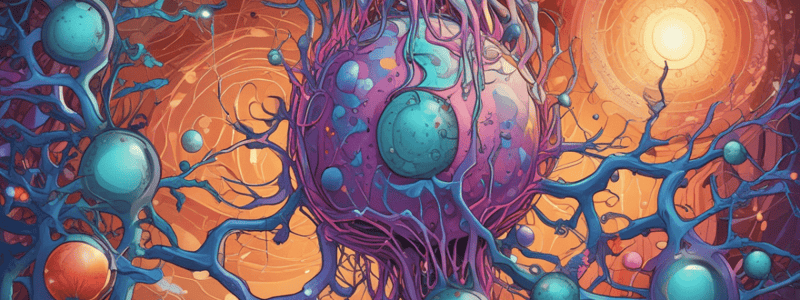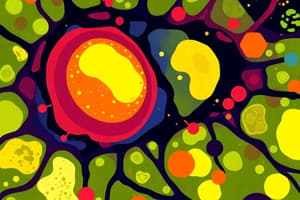Podcast
Questions and Answers
What is the primary function of oxygen in cells?
What is the primary function of oxygen in cells?
- To regulate cell growth
- To maintain cell shape
- To synthesize proteins
- To produce energy for cell function (correct)
What is the main difference between intracellular and extracellular fluid?
What is the main difference between intracellular and extracellular fluid?
- Extracellular fluid has a higher concentration of ions
- Intracellular fluid is more alkaline
- Intracellular fluid has a different ionic composition (correct)
- Extracellular fluid is static, while intracellular fluid is dynamic
What is the term for the fluid surrounding cells that provides nutrients and ions?
What is the term for the fluid surrounding cells that provides nutrients and ions?
- Plasma
- Extracellular fluid (correct)
- Interstitial fluid
- Intracellular fluid
What is the primary function of the bones of the skull?
What is the primary function of the bones of the skull?
What is the percentage of body weight that is composed of body fluids?
What is the percentage of body weight that is composed of body fluids?
What is the term for the process by which cells generate energy from nutrients?
What is the term for the process by which cells generate energy from nutrients?
What is the main function of fibrinogen in blood plasma?
What is the main function of fibrinogen in blood plasma?
What is the approximate percentage of red blood cells in whole blood?
What is the approximate percentage of red blood cells in whole blood?
What is the primary function of immunoglobulins in blood plasma?
What is the primary function of immunoglobulins in blood plasma?
What is the approximate number of white blood cells per milliliter of blood?
What is the approximate number of white blood cells per milliliter of blood?
What is the main function of albumin in blood plasma?
What is the main function of albumin in blood plasma?
What is the primary function of red blood cells?
What is the primary function of red blood cells?
What is the primary function of red blood cells in the human body?
What is the primary function of red blood cells in the human body?
What is the approximate number of cells in the entire human body?
What is the approximate number of cells in the entire human body?
What is the term for the scientific study of functions and mechanisms in a living system?
What is the term for the scientific study of functions and mechanisms in a living system?
What is the main purpose of physiology?
What is the main purpose of physiology?
What is the term for the basic living unit of the body?
What is the term for the basic living unit of the body?
What is the term for the study of the functions and mechanisms of the human body?
What is the term for the study of the functions and mechanisms of the human body?
What percentage of the body's water is intracellular fluid?
What percentage of the body's water is intracellular fluid?
What is the function of the interstitial fluid?
What is the function of the interstitial fluid?
Which organ has the highest water content?
Which organ has the highest water content?
What is homeostasis?
What is homeostasis?
What is the second largest component of body fluids?
What is the second largest component of body fluids?
What is the function of the Blood Circulatory System in relation to extracellular fluid?
What is the function of the Blood Circulatory System in relation to extracellular fluid?
What percentage of body weight is composed of body fluids?
What percentage of body weight is composed of body fluids?
What is the primary function of extracellular fluid?
What is the primary function of extracellular fluid?
What is the term for the fluid that surrounds cells?
What is the term for the fluid that surrounds cells?
What is the approximate proportion of body fluids that is intracellular fluid?
What is the approximate proportion of body fluids that is intracellular fluid?
What is the term for the 'internal environment' in which cells live?
What is the term for the 'internal environment' in which cells live?
What is in continuous movement in the body?
What is in continuous movement in the body?
What is the primary function of the blood in the human body?
What is the primary function of the blood in the human body?
What is the approximate volume of blood in a male's body?
What is the approximate volume of blood in a male's body?
What is the primary function of the interstitial fluid?
What is the primary function of the interstitial fluid?
What is the primary mechanism of homeostasis in the body?
What is the primary mechanism of homeostasis in the body?
What is the main function of the second stage of fluid movement?
What is the main function of the second stage of fluid movement?
What is the percentage of body weight that is composed of blood?
What is the percentage of body weight that is composed of blood?
The brain has a water content of 80 percent.
The brain has a water content of 80 percent.
Blood plasma is the largest part of the extracellular fluid.
Blood plasma is the largest part of the extracellular fluid.
The two stages of extracellular fluid transport and mixing involve the lymphatic system and the blood circulatory system.
The two stages of extracellular fluid transport and mixing involve the lymphatic system and the blood circulatory system.
Homeostasis refers to the constant change in the internal environment.
Homeostasis refers to the constant change in the internal environment.
The interstitial fluid surrounds blood cells.
The interstitial fluid surrounds blood cells.
The lungs have the highest water content among all organs in the human body.
The lungs have the highest water content among all organs in the human body.
Plasma is the liquid portion of the blood that contains potassium, magnesium, and phosphate ions.
Plasma is the liquid portion of the blood that contains potassium, magnesium, and phosphate ions.
The extracellular fluid is in a static state and does not move.
The extracellular fluid is in a static state and does not move.
Homeostasis is the process by which cells generate energy from nutrients.
Homeostasis is the process by which cells generate energy from nutrients.
Interstitial fluid is a type of intracellular fluid that surrounds cells.
Interstitial fluid is a type of intracellular fluid that surrounds cells.
The blood volume of a male is approximately 4 liters.
The blood volume of a male is approximately 4 liters.
Blood is thinner than water.
Blood is thinner than water.
The primary function of the interstitial fluid is to regulate body temperature.
The primary function of the interstitial fluid is to regulate body temperature.
Homeostasis is the process of generating energy from nutrients.
Homeostasis is the process of generating energy from nutrients.
The brain has a water content of 70 percent.
The brain has a water content of 70 percent.
The blood circulatory system is responsible for regulating the water content of cells.
The blood circulatory system is responsible for regulating the water content of cells.
Blood plasma is the largest part of the intracellular fluid.
Blood plasma is the largest part of the intracellular fluid.
The two stages of extracellular fluid transport and mixing involve the lymphatic system and the respiratory system.
The two stages of extracellular fluid transport and mixing involve the lymphatic system and the respiratory system.
Homeostasis refers to the constant change in the external environment.
Homeostasis refers to the constant change in the external environment.
Interstitial fluid surrounds the entire human body.
Interstitial fluid surrounds the entire human body.
The brain has a water content of 95 percent.
The brain has a water content of 95 percent.
Blood plasma is a clear liquid that contains 45% water.
Blood plasma is a clear liquid that contains 45% water.
Fibrinogen is responsible for maintaining blood osmotic pressure.
Fibrinogen is responsible for maintaining blood osmotic pressure.
Homeostasis is the process by which cells generate energy from nutrients.
Homeostasis is the process by which cells generate energy from nutrients.
Interstitial fluid is a component of intracellular fluid.
Interstitial fluid is a component of intracellular fluid.




